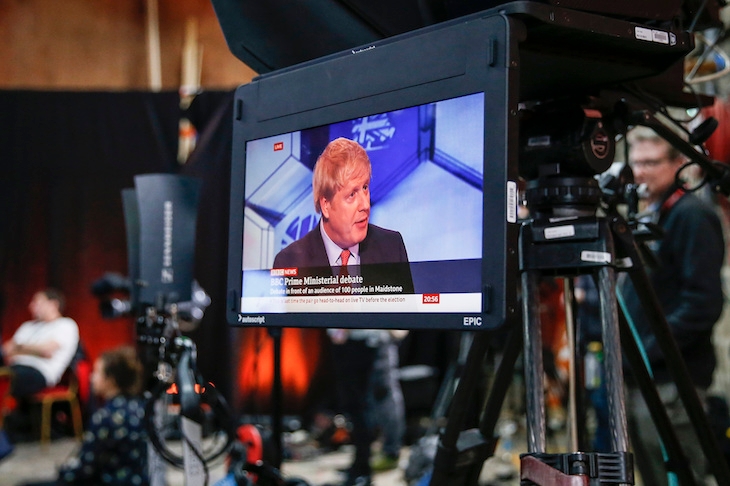Has Boris decided this election is in the bag? I ask because this afternoon he’s made just about the first bold policy announcement of the campaign. After a safety-first manifesto and little other announcements so as not to frighten the horses, he has stuck his neck out and suggested that the TV licence might be on borrowed time. Having said he was under pressure not to make up policy ‘on the hoof’ he went on, well, almost to make a policy on the hoof:
‘You have to ask yourself whether that kind of approach to funding a media organisation still make sense in the long term, given the way other organisations manage to fund themselves’.
How odd that it has taken a Prime Minister, or even a party leader, this long even to contemplate ending the TV licence. Whole tranches of the state have been privatised over the past 40 years, and yet still we have a state broadcasting service that is funded via a hypothecated tax – a system that dates from the days when the technology did not exist to charge for watching an individual TV channel and devised at a time when broadcasting was, in any case, a state monopoly. It ought to be pretty obvious that such an arrangement is bad for competition.
It is as if we were all forced to pay an annual fee to Tesco, in return for which we could help ourselves to all the groceries we liked at no further cost, and we still had to pay Tesco even if we wanted to do our shopping at Sainsbury’s or Asda. What would that do for the market in food? It would quite clearly kill all competition, as well as damage the quality of the food on sale at Tesco.
Yet no government has felt brave enough to make the case for doing away with the TV licence fee. Why? Possibly because they have feared that the BBC has a touch of the NHS about it – it is an institution that the British love, for all its faults. Or maybe they feel – for all they bleat about BBC bias – that deregulation of the broadcasting sector would leave them at the mercy of channels that felt less need to respect impartiality.
Either way, the TV licence is reaching its end – whether political leaders want to preserve it or not. Last year, the number of licences sold fell for the first time, with 37,000 fewer households deciding they need a licence. With masses of entertainment now available on Netflix and other internet-based services, it is not hard to see why many people have come to this conclusion – especially the young, who move quickly between rented accommodation and for whom a property-based licence fee is a huge inconvenience.
The tragedy of the BBC is that it cannot see its own nemesis. It clings to the licence fee like a comfort blanket, refusing to contemplate life on a fully-commercial footing. If it had genuine confidence in the quality of its product it wouldn’t need to worry of course – we would all choose to pay a subscription fee. In contemplating the end of the licence fee, Boris is being kind. The only thing that will save the BBC from a sad, lingering death is if a commercial charging structure is forced on it.







Comments